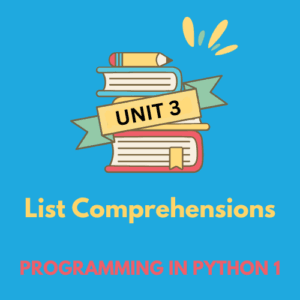
Click On the Download Button Below 
Introduction to List Comprehension In Python :-
List comprehension offers a shorter syntax when you want to create a new list based on the values of an existing list.
List comprehension is considerably faster than processing a list using for loop.
The list comprehension syntax contains three parts: an expression, one or more for loop, and optionally, one or more if conditions.
The list comprehension must be in the square brackets [].
The result of the first expression will be stored in the new list. The for loop is used to iterate over the iterable object that optionally includes the if condition.
Objectives of List Comprehension In Python :-
Concise and Readable Code:
List comprehension provides a more compact and readable way to create lists compared to traditional for-loops.Efficiency:
It offers a more efficient way to generate lists, as the iteration and list construction are handled in a single expression.Expressiveness:
Allows for more expressive and declarative code by combining loops and conditional logic into a single line.Filter and Transform in One Step:
Enables both filtering and transforming elements of a sequence in a single, concise line.Improved Performance:
List comprehensions are often faster than using a for-loop due to internal optimizations.Avoiding the Use of
append():
Instead of usingappend()in a loop, list comprehension eliminates the need for this, making code more compact.Better Memory Management:
The implementation of list comprehensions typically results in fewer intermediate objects, making them more memory-efficient than traditional loops.Supports Conditional Logic:
Allows the inclusion of conditionals (e.g.,ifstatements) to filter elements directly within the comprehension.
Summary of List Comprehension In Python :-
List comprehension in Python is a concise and efficient way to create lists by applying an expression to each item in an existing iterable (like a list or range). It combines a loop and an optional condition in a single line, making the code more readable and compact. List comprehensions can be used for tasks like filtering, transforming, or generating new lists.
